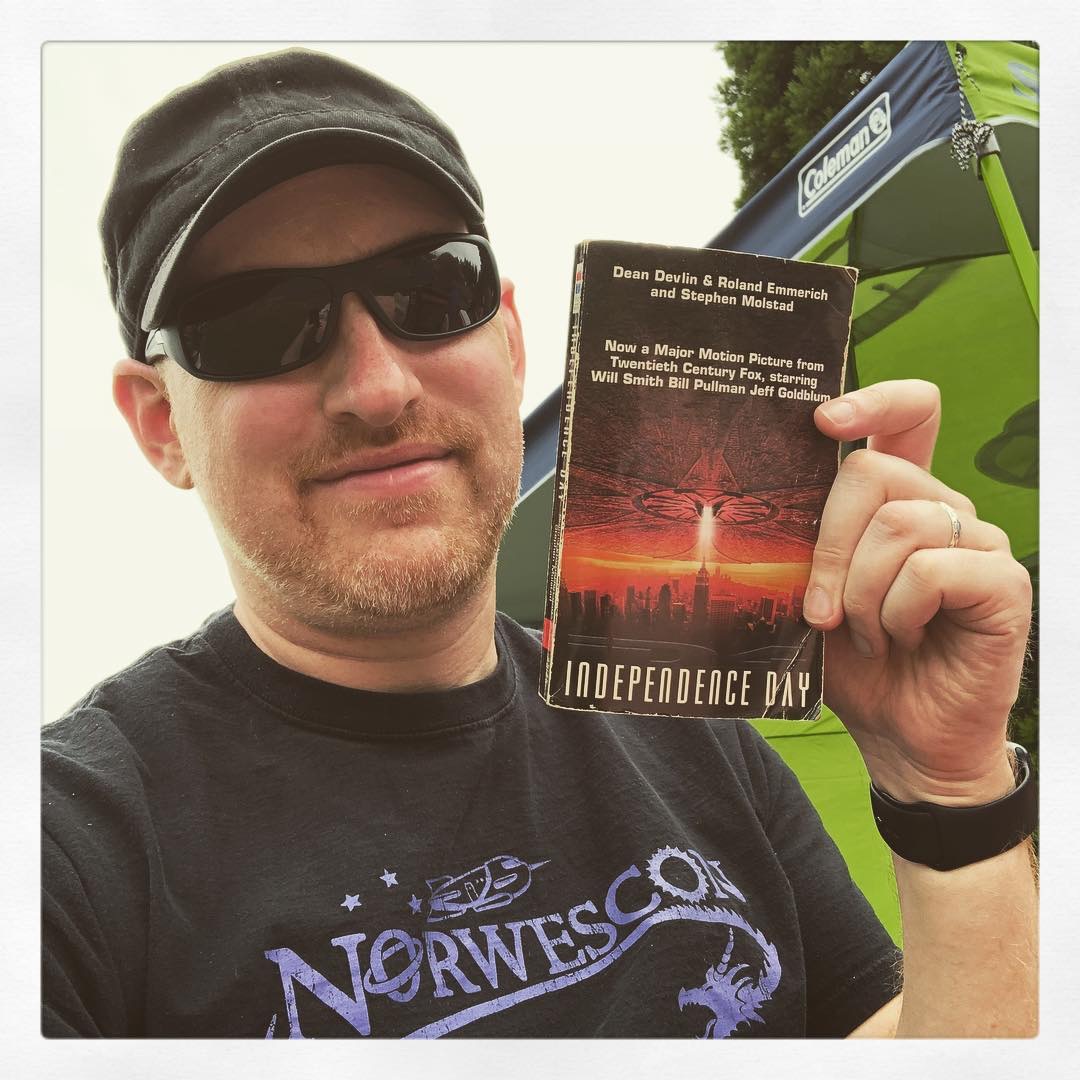Book twenty-four of 2018: Independence Day, by Dean Devlin, Roland Emmerich, and Stephen Molstad. ⭐️⭐️⭐️

Enthusiastically Ambiverted Hopepunk
Book twenty-four of 2018: Independence Day, by Dean Devlin, Roland Emmerich, and Stephen Molstad. ⭐️⭐️⭐️

Hey @cajunsblues: I landed a great lineup of fluff at Goodwill today. Thought you’d appreciate it. ;)

I got back home a bit ago from seeing Roland Emmerich‘s latest death, doom, and destruction lovefest: The Day After Tomorrow. The verdict? Surprisingly, not nearly as bad as I was expecting it to be, as long as you keep in mind that it’s your typical summer disaster movie, big on special effects, and short on plausible plot.
The first half of the film, dealing with all of the cataclysmic weather tearing through the world (mostly the US, though we are treated to shots of gargantuan hailstones in Tokyo and snow in New Delhi), is by far the stronger half. Since it doesn’t have to worry about niggling little details about why things are happening or how people are coping and is free to just let the effects department run rampant, it’s actually a lot of fun. Okay, so this is defining “fun” in a somewhat odd way — wholesale destruction and massive loss of life — but hey, it works.
It’s the latter half of the film where things get iffy. None of the various plot threads are really that gripping, and many of the actions taken are silly at best, and fairly ludicrous at worst. When a small group of survivors hole up inside a room in the New York Library and start burning books in the fireplace in order to stay warm, one really has to wonder why they don’t start breaking down the heavy wooden tables, chairs and sofas, or tear into some of the wood paneling all around the room for some longer-lasting and better burning fuel, for instance.
One thing that was bugging me a bit as the movie went on was how badly the passage of time was managed. While there were numerous remarks about the superstorm that glaciates the entire Northern hemisphere lasting for seven to ten days, it was very difficult to tell when time jumps were being made. Scenes just cut one to another, and aside from the occasional easily-missed line about something happening “a couple of days ago”, there was no real way to tell when scenes were changing between events taking place at roughly the same time, and when scenes were jumping forward hours or days at a time. Anything from a few quick montages, or even wipes or dissolves rather than jump cuts could have done a lot to make the passage of time a little more obvious.
I will say that I think (hope) that Emmerich may be on a bit of an upswing again, though. I’ve watched his career as a director sink pretty steadily downwards through the years, but even with all its flaws, I found TDAT entertaining enough that it gives me hope that there may be more in the future that is at least watchable. ;) My basis for this is as follows:
Here’s hoping that the pendulum will continue to swing in Emmerich’s favor, and that his next film — King Tut, according to the IMDB — will actually be at least decent, and maybe even actually something close to worthwhile.
Scientifically, of course, the whole movie is laughable. I had some fun after I got home looking up some of the articles that have popped up on the web in the past week or so taking a critical look at the science in the film.
From the Seattle PI, Scientists scoff as climates run amok on big screen:
“Shameless scientific prostitution,” blasted Gerard Roe, professor in the Department of Earth and Space Sciences.
The Statue of Liberty knee-deep in snow with taxi-sized icicles dangling off her nose? A bit of a stretch?
“It was a gross distortion of almost everything we know,” Roe slammed.
And the team of tornadoes that leveled half of Los Angeles? A tad over the top?
“The whole thing is absurd,” declared David Battisti, director of the Earth Initiative, a UW-wide program looking at the effect of humans on the planet.
From TechNewsWorld, ‘The Day After Tomorrow’ Heats Up a Political Debate:
“I’m heartened that there’s a movie addressing real climate issues,” says Marshall Shepherd, a research meteorologist at NASA’s Goddard Space Flight Center in Greenbelt, Md. “But as for the science of the movie, I’d give it a D minus or an F.”
From MTV’s review, ‘Day After Tomorrow’ Rich In Effects But Hilariously Implausible:
And where did this “science” come from? Well, it’s worth noting that “The Day After Tomorrow” was “suggested in part” by a book called “The Coming Global Superstorm,” by Art Bell and Whitley Strieber. Art Bell is a UFO buff who hosts a syndicated radio show devoted to the paranormal. Whitley Strieber is the author of a best-selling 1987 book about his many encounters with space aliens. The name of the book is “Communion: A True Story.”
Lastly, MSNBC has a good Q-and-A page about some of the climactic theories put forth in the film.